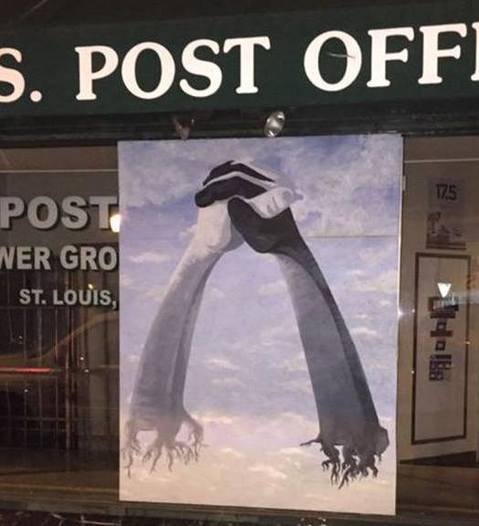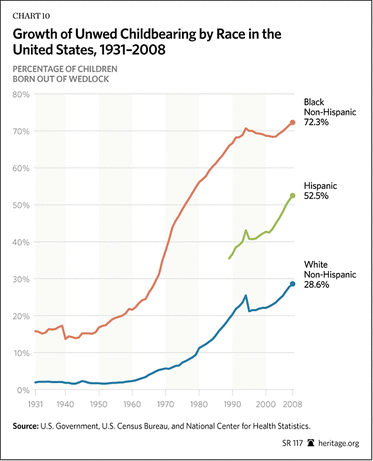 A painting at a US Post Office in St. Louis
A painting at a US Post Office in St. Louis I am a 64 year old father and grandfather. I have written a book about what it means to be a dad and I blog about fatherhood as you are aware if reading this. I am confident in discussing parenting and fatherhood issues, especially how to raise children in a positive atmosphere. What I am not confident about is discussing the issues of race. With the incidents which occurred in Ferguson MO this year, race is the big topic--but I see it in a different light. I see it as an issue with the core family, and the significance of having fathers in the home. Being White, I could never see the issues Blacks endure as they can. But a father is a father in any culture.
In the aftermath of the tragic Michael Brown shooting, and after the Grand Jury decision, Ferguson erupted in riots. Scores or hundreds of mostly young Black men and women broke windows, looted, and burned businesses. Is this kind of behavior “Black”? Of course not! I think this very small subset of the Black community lacks values and respect for themselves, their community, and others because of broken families.
When my book, The Power of Dadhood, comes out in April 2015, you will not find any opinions or comments on race, because I didn’t consider race. I look at children, families, and fathers--and their relationships, responsibilities, and challenges. Race is relevant to the discussion of fatherlessness only when you consider the likelihood of a fatherless family situation. It just so happens that fatherless homes are much more prevalent in Black homes.
 Unwed Childbearing soared for Blacks during the 60s
Unwed Childbearing soared for Blacks during the 60s “When 72% of black children are born without a father (in the home) compared to 28% of white children, you're going to have more (young) black males (and females) out of control. It's more about responsible parenting than what race you are.”
It wasn’t always this way. Fifty years ago, Black families were many times more likely to have a father in the home. Why this changed is a debate many have. (see chart)
I know the town of Ferguson quite well. I live nearby and my brother lived there for years. It is also where my father-in-law had a business in the 1970’s and 80’s. Ferguson has the same issues that many lower social-economic towns do--youths without direction with many families that are not whole. It’s my theory and contention that if there was a way to interview every thief, arsonist and opportunist who participated in the riotous behavior in Ferguson, almost all would be from broken homes, will have had little or no mentoring, and/or were influenced by the wrong people. They didn’t care about Michael Brown or the Grand Jury decision, and if they did, justice was not on most of their minds as they broke windows, torched businesses and stole everything from hair extensions to beer.
My quote above was interpreted as racist by several people with whom I communicate--all but one were White men. Their basic contention was that “I should not blame Black men” (fathers), I should “blame systematic racism”. It seems that any mention of race clouds the issue and many people become both offensive and defensive—one of the reasons the issues of race are never resolved. As soon as I say “Black” in any sentence, my real message of “missing fathers” is lost. Every family of every race has more potential for success when there is a strong male presence in the home. Crime, drugs, suicide, dropping out of school, all increase significantly among children who don’t have this basic need of a concerned dad.
This is all an introduction to an article a good friend sent to me. I cannot speak for or against the causes, fears, or feelings of other races, nor do I want to point fingers at anyone, other than irresponsible parents. I can speak for fathers and to fathers. It is difficult for me, however, to admonish any father who is Black, because I am White. I get it. Therefore, here is an article by a Black pastor who says the things I cannot say about the topic of fatherhood as it relates to the Black father and his family.
Please take time to read this outstanding article, Thoughts on Ferguson, by Voddie Baucham, the pastor of preaching at Grace Family Baptist Church in Spring, Texas. You and/or I may not agree totally with all of the pastor's views, but when he discusses fatherlessness and its impacts, he is right on target!
Finally
Here are facts about crime and families, without any reference to race.
A review of the empirical evidence in the professional literature of the social sciences gives policymakers an insight into the root causes of crime. Consider, for instance: *
- Over the past thirty years, the rise in violent crime parallels the rise in families abandoned by fathers.
- High-crime neighborhoods are characterized by high concentrations of families abandoned by fathers.
- State-by-state analysis by Heritage scholars indicates that a 10 percent increase in the percentage of children living in single-parent homes leads typically to a 17 percent increase in juvenile crime.
- The rate of violent teenage crime corresponds with the number of families abandoned by fathers.
- The type of aggression and hostility demonstrated by a future criminal often is foreshadowed in unusual aggressiveness as early as age five or six.
- The future criminal tends to be an individual rejected by other children as early as the first grade who goes on to form his own group of friends, often the future delinquent gang.
- Neighborhoods with a high degree of religious practice are not high-crime neighborhoods.
- Even in high-crime inner-city neighborhoods, well over 90 percent of children from safe, stable homes do not become delinquents. By contrast only 10 percent of children from unsafe, unstable homes in these neighborhoods avoid crime.
- Criminals capable of sustaining marriage gradually move away from a life of crime after they get married.
- The mother's strong affectionate attachment to her child is the child's best buffer against a life of crime.
- The father's authority and involvement in raising his children are also a great buffer against a life of crime.





